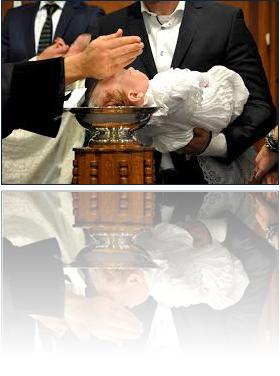The Confession of Faith Article 34 Of Holy Baptism
The Confession of Faith Article 34 Of Holy Baptism
Holy Baptism has always been a very controversial subject in the various churches, even though God's Word shows the right way clearly enough. This article on baptism begins by saying, "We believe and confess that Jesus Christ, Who is the end of the law, hath made an end, by the shedding of His blood, of all other sheddings of blood which men could or would make as a propitiation or satisfaction for sin." Thus it is stated that the ceremonial laws came to an end when Christ died for His church on Golgotha, and this has also had its influence upon the sacraments.
The Greek word 'baptismos' means immersion or sprinkling, and this is the baptism which came in the place of circumcision, the sacrament of the Old Testament. A sacrament is a sign and seal of God's grace. The Lord commanded Abraham (Genesis 17) not only to circumcise his son, but also all who were born in his house or were bought with money. Those who were not circumcised would be cut off from his people, for he had broken the covenant of the Lord.
This sacrament of circumcision was a Divine institution, although it is also known in other nations. The Muslims circumcise their sons between the ages of 12 to 15 years, and they do this because Ishmael was circumcised at the age of 13. In several places of Scripture (for example, Colossians 2:11) circumcision is portrayed as a sign and seal of the circumcision of the heart, or of regeneration. In Colossians 2:17 Paul shows that the Old Testament ceremonies, also circumcision, were as shadows which were fulfilled in Christ. At the Synod of Jerusalem which is described in Acts 15 it was decided that the Gentiles should not be circumcised.
With the satisfaction made by Christ is was no longer necessary to shed blood, and therefore we now have the unbloody baptism in its stead. Peter received clear instruction that circumcision was abolished, as he explained in Acts 10:28, "And he said unto them, Ye know how that it is an unlawful thing for a man that is a Jew to keep company, or come unto one of another nation; but God has shewed me that I should not call any man common or unclean."
The bloody cutting of the foreskin pointed to the necessary removal of all uncleannesses of both original and actual sins by the blood of Christ. We have mentioned it earlier that the Lord was very strict in the requirements of circumcision and that trespassing this commandment would be punished with death. This is related to God's commandment for conversion, the circumcision of the heart; if this does not take place, then the wrath of God will rest upon us.
Corporal circumcision is no ground for eternity, for eternal blessings are only given by the Lord out of free grace. Enough evidence is given to show that circumcision was no longer a law after Christ had died. The sacrament of Holy Baptism began after the resurrection of Christ, since He had brought the true sacrifice. The outward sign changed, but the essence remained the same. Prior to this John the Baptist had also baptized, which was from heaven. Those baptized by him did not have to be baptized again. We read in Acts 19 about the men in Ephesus who had been baptized by John, but they had not received the outpouring of the Holy Ghost. These men had heard John and had been baptized by him, and this was not repeated.
Circumcision has thus been abolished, and the Lord has instituted baptism, of which our article states: "by which we are received into the Church of God, and separated from all other people and strange religions, that we may wholly belong to Him, Whose ensign and banner we bear." As Israel was separated from all other nations, so likewise is the New Testament Israel. Israel was the people of the covenant in the external form, but many of them missed the essence of the covenant in their hearts. For us baptism is the sacrament of birth and incorporation in the church. It is an ensign and banner to distinguish us from all other people and strange religions of these days. So many today forget what our fathers wrote in the confession centuries ago and are not a people separated from the world!
There is a twofold relationship to the covenant. All who are baptized, thus the entire church, have an external relationship to the covenant, but God's people are incorporated into the covenant. This takes place in regeneration when true faith is given in the heart. All orthodox theologians confess this twofold relationship. Think only of Ishmael and Isaac. Both were circumcised, but both did not take part in grace. How necessary also for us to be incorporated into the covenant! If we are still strangers of it, then we should hasten for our life's sake, supplicating for grace.
Baptism is not only a sign, but also a seal of God's grace, as is here stated, "and which serves as a testimony to us, that He will forever be our gracious God and Father." In the form of baptism we read of the promises given by a Triune God, "For when we are baptized in the Name of the Father, God the Father witnesseth and sealeth unto us, that He doth make an eternal covenant of grace with us, and adopts us for His children and heirs, and therefore will provide us with every good thing, and avert all evil or turn it to our profit."
When we read this, it seems that baptism will give eternal life, but we must remember that the forms of the sacraments of baptism and the Lord's Supper are written in the essence of faith! With whom does the Lord make a covenant? Who are His children? For whom must all things work together for good? Is it to all those who are baptized! Of course not! Think only of Simon the sorcerer! No, the Lord makes a covenant with His people. When there is written that we are washed in the blood of Christ, this is not applicable to all people! The Holy Ghost does not give the assurance of forgiveness of sin to all who are baptized, but only the true church knows the administration of the Holy Ghost. Therefore in baptism there is the assurance that the unchangeable God of the covenant will not forsake His church.
Are we also a member of that church?
As we proceed further into this article, we find that our fathers emphasized the command of Christ to baptize in the Name of the Triune God, saying, "Therefore He has commanded all those, who are His, to be baptized with pure water, 'in the Name of the Father, and of the Son, and of the Holy Ghost.'" The apostles have baptized in the Name of the Lord or in the Name of Jesus Christ, but this does not mean that the Name of the Triune God was not used. Today it often happens in the modern churches that baptism is performed in the name of "faith, hope and charity". Such a baptism is not acceptable for us, since it is contrary to the institution of Christ.
It also states here that it should take place with pure water, and not, as is the custom in the church of Rome, to add oil and spittle to the water. John baptized in the river Jordan, and the eunuch was baptized in water along the way as they travelled. Only clear water takes away the uncleanness of the body, and so the water in baptism points to the all-cleansing power of the blood of Christ; never is the sin too much or the sinner to unclean.
 In the immersing or sprinkling with water we find a great similarity between the sign and the true meaning of the sacrament. The immersing, and also the sprinkling, point to the mortification of the old man. Coming up out of the water signifies the resurrection of the new man. or the quickening which becomes visible in man. By the Holy Spirit our mind is enlightened to know our uncleanness, but the Lord also gives then to experience that in Christ the needy are helped. Sin becomes such a burden, but the Holy Spirit teaches how they can receive remission of sin by the blood of Christ. This instruction the Lord is pleased to give also through the sacraments, as is here stated in regard to baptism: "Thereby signifying to us, that as water washeth away the filth of the body, when poured upon it, and is seen on the body of the baptized, when sprinkled upon him; so doth the blood of Christ, by the power of the Holy Ghost, internally sprinkle the soul, cleanse it from its sin, and regenerate us from children of wrath, unto children of God. Not that this is effected by the external water, but by the sprinkling of the precious blood of the Son of God; Who is our Red Sea, through which we must pass, to escape the tyranny of Pharaoh, that is, the devil, and to enter into the spiritual land of Canaan."
In the immersing or sprinkling with water we find a great similarity between the sign and the true meaning of the sacrament. The immersing, and also the sprinkling, point to the mortification of the old man. Coming up out of the water signifies the resurrection of the new man. or the quickening which becomes visible in man. By the Holy Spirit our mind is enlightened to know our uncleanness, but the Lord also gives then to experience that in Christ the needy are helped. Sin becomes such a burden, but the Holy Spirit teaches how they can receive remission of sin by the blood of Christ. This instruction the Lord is pleased to give also through the sacraments, as is here stated in regard to baptism: "Thereby signifying to us, that as water washeth away the filth of the body, when poured upon it, and is seen on the body of the baptized, when sprinkled upon him; so doth the blood of Christ, by the power of the Holy Ghost, internally sprinkle the soul, cleanse it from its sin, and regenerate us from children of wrath, unto children of God. Not that this is effected by the external water, but by the sprinkling of the precious blood of the Son of God; Who is our Red Sea, through which we must pass, to escape the tyranny of Pharaoh, that is, the devil, and to enter into the spiritual land of Canaan."
Many times the question is asked whether it is right to sprinkle water on the forehead, since God's Word so often mentions immersing. In the early days of the New Testament immersing was customary, although it also happened that the water was sprinkled, since God's Word speaks of the water of sprinkling. The three thousand on the day of Pentecost were probably not all immersed in the water, nor apparently was the jailor. The sick were baptized while on their beds. The Didache, which are old writings from the beginning of the second century, says, "When there is no streaming water, you take dead water; if both are not available, you pour water three times upon the forehead in the Name of the Father, and of the Son, and of the Holy Ghost."
The Synod of Neo-Caesarea in the year 314 explained that sprinkling with water was according to God's Word, although preference was given to immersing. In the western countries it was the custom in the 12th century to sprinkle, because immersing was not without danger in the colder climates. The Greek churches require immersing, as do also the Baptists.
Rome teaches that the external water is the washing away of our sins, while Luther binds the grace of God to baptism by the power of the Word. Baptism would then be the beginning of regeneration, that is, when the minister pronounces the baptism formula. The Reformed do not want to hear of such baptismal-grace, since it contradicts the Word of God. The work of God's servants is not unimportant, but they are not able to give such a blessing. This is well expressed by the apostle Paul, who said, "I have planted, Apollos watered; but God gave the increase."
 Not only do God's servants have no power to bless the sacrament unto salvation, but also the sign, the water, has no such power. In no place can we find in God's Word that water has such spiritual power as Rome and Luther teach. The servant gives the sign, but the Lord must give the invisible thing signified. How true it is, as described in this article: "Therefore the ministers, on their part, administer the sacrament, and that which is visible; but our Lord giveth that which is signified by the sacrament, namely, the gifts and invisible grace; washing, cleansing and purging our souls of all filth and unrighteousness; renewing our hearts, and filling them with all comfort; giving unto us a true assurance of His fatherly goodness; putting on us the new man, and putting off the old man with all his deeds." Man is not able to give anything, but the Lord is the giver of all good.
Not only do God's servants have no power to bless the sacrament unto salvation, but also the sign, the water, has no such power. In no place can we find in God's Word that water has such spiritual power as Rome and Luther teach. The servant gives the sign, but the Lord must give the invisible thing signified. How true it is, as described in this article: "Therefore the ministers, on their part, administer the sacrament, and that which is visible; but our Lord giveth that which is signified by the sacrament, namely, the gifts and invisible grace; washing, cleansing and purging our souls of all filth and unrighteousness; renewing our hearts, and filling them with all comfort; giving unto us a true assurance of His fatherly goodness; putting on us the new man, and putting off the old man with all his deeds." Man is not able to give anything, but the Lord is the giver of all good.
Thus the confession has defended the truth against Rome and Luther. However, there are more errors to be discussed. We are thinking of the Anabaptists and the Baptists, who believe that baptism is only to be administered to adults by immersing. They want a church of only converted people, and those who were baptized in infancy are baptized again. To what extent this doctrine has spread we will see next time, the Lord willing. We do not believe in a second baptism; once is sufficient. Baptism is the institution of the Lord, but we must also be baptized with the Holy Spirit. May the Spirit of Pentecost work powerfully in our hearts.
Now we will try to write something about the doctrine of the Anabaptists, or the Baptists, as they are usually called.
I am certain that my readers know their viewpoints regarding baptism, namely, that only adults are baptized and that by immersion, and that those who were baptized in their youth must be baptized again. They also require a personal confession of faith at that time, as we hope to see later. This means that they are looking for a church of converted people only.
But let us try to follow with our article. We read, "Neither doth this baptism only avail us, at the time when the water is poured upon us, and received by us, but also through the whole course of our life." This part of the article deals with persons of the church of former days who thought that baptism was connected with the sins of the past, and that when it was administered, the sins committed until then were forgiven. Many therefore did not become baptized in their youth, but postponed it as long as possible, waiting until they became seriously ill or even were on their deathbed. In times of epidemics, earthquakes, disasters or wars, so many people were requesting baptism that the ministers and priests could hardly fulfill their task.
Such things took place because the people did not have a proper understanding of the meaning of baptism. It is not the washing away of the sins of the past. We confess that baptism is a sign and a seal of the washing away of the sins committed both before and after baptism. Baptism is a continual remembrance of what the God of the covenant has said, "For the promise is unto you, and to your children." Likewise Isaiah wrote, "And all thy children shall be taught of the Lord." Our fathers have also spoken in this way, which then became the condemnation of the Baptists. They wrote, "Therefore we detest the error of the Anabaptists (that is, against baptism), who are not content with the one only baptism they have once received, and moreover condemn the baptism of the infants of believers, whom we believe ought to be baptized and sealed with the sign of the covenant, as the children in Israel formerly were circumcised, upon the same promises which are made unto our children. And indeed Christ shed His blood no less for the washing of the children of the faithful, than for adult persons."
The confession relates baptism with God's covenant and His promises. The Lord made a covenant with Abraham, but the children are also included. God's covenant is the strong foundation of infant baptism. Under the Old Testament the Israelites with their children were under the Covenant; the Lord called them His children, although they were not all true converted Israelites, but only had an external relationship to the covenant. Without regeneration we miss the incorporation into the covenant. In like manner the basis of infant baptism is the covenant of grace. The question is not whether the children or the parents are regenerated, but in baptism God confirms His covenant to the salvation of the elect and to the comfort of His people. At God's time the elect become partakers of Christ's merits, the one in his youth, the other when he is old, all according to God's free and sovereign pleasure.
Baptism does not take place on the ground of presupposed regeneration, as Kuyper has said. We would only have to show that this is true in our life by our Christian conduct, and are then children of the covenant. Thousands are deceived in this way for a great eternity! We must go back to the time of Christ and of the apostles, who received the commandment from Christ Himself to preach and to baptize, to discover whether infant baptism is right or wrong. It is true that the disciples did not begin by baptizing the children among the Gentiles. Every missionary will first preach God's Word according to the command of Christ. When they gladly receive the Word, they will be baptized, but then also the little children receive the sacrament.
The Anabaptists have a text in God's Word which they consider to be a condemnation of infant baptism, but which I believe they have interpreted according to their own viewpoint. In Mark 16:15-16 the Lord Jesus commanded His disciples to preach the gospel all over the world. Then He said, "He that believeth and is baptized shall be saved; but he that believeth not shall be damned." It is clear that we find here that first of all we are to believe and then we can be baptized. The Anabaptists say that children cannot comprehend the truth and therefore are unable to believe, which means that we may not baptize a child. Baptism is also a sacrament to strengthen faith, but children cannot exercise faith, and therefore again no baptism for children.
Can we say something against this, for it seems to be written so logically. Yes, we can, because I believe that we have here a misinterpretation of God's Word. The Lord Jesus gave commandment to His disciples to go out to the Gentiles, who, as stated above, had no knowledge of the Word, but when they accepted the truth after instruction therein, they with their children were baptized. The ground of baptism is not the faith of the children, but is God's covenant and His promises. The right to baptize does not lie in faith, in the ability to believe, and in conversion, but it is a sign and seal of God's promises, which can only be received by faith.
If we had a little more knowledge of the truth, I do not think it would be so difficult, young people. Ask the Lord to enlighten our minds, and then there will also be more desire to search the Scriptures, which speak of the Lord, His commandments, and also the institution of the sacraments, which are so often misinterpreted.
As we again write about baptism, there is one statement which we made last time that we would like to repeat, and that is that the ground of infant baptism lies in the covenant and promises of God.
The opponents of infant baptism always ask us to show them a text in defence of our doctrine, a text where the Lord clearly commands the baptism of children. It is true that we cannot point to a text in one of the books of the New Testament, since we do not have an express command regarding it. But we have a counter-question. Where do you find the command that adults only be baptized? This they do not have either. Does this mean that we and the Baptists are on an equal footing as touching New Testament evidence, since neither part seems to be able to prove it from God's Word?
No, to this we do agree. We have said several times that the grounds of infant baptism lies in the covenant and promises of God! We believe that the covenant signs have changed, but the covenant administration has not changed. The eternal God made a covenant which is the same under both the Old and the New Testament. However, under the ceremonies of the Old Testament everything was under a cover and in bonds, whereas under the New Testament these things became broader and more clear. For example, in former days only the men were circumcised, because the women were counted in the men; now both men and women are baptized. There is nobody that makes objection because women are baptized! We have no express command of Christ regarding the change of the Sabbath to Sunday (although it is according to God's Word), but we all go to church on Sunday. Then when infant baptism is mentioned, they would suddenly make the covenant more limited under the New Testament; the children are to be excluded and only adults may be baptized.
Infant baptism came in place of circumcision, which was to take place on the eighth day. Therefore we may baptize infants, because the God of the covenant is unchangeable. If this had not been the will of God, He would have made it known to His church. When Israel left the Lord and rejected Him, He still called the children to come unto Him. The same view was taken by the apostles. On the day of Pentecost, Peter spoke of the old covenant dispensation as it was foretold by the prophet Joel and now fulfilled. The multitude was as a net full of good and bad fish, but Peter said unto them, "The promise is unto you and to your children." This is according to Genesis 17:7. Boston said of the multitude that there hands were unclean from the blood of Christ, and still the promise comes to them and to their children. It is because of the covenant relation which the Lord had made with Abraham, Isaac and Jacob. Although they have rejected Christ, the covenant is still there. In I Corinthians 7:14 we read that the children of believing parents are to be viewed as sanctified, meaning separated from the world, and this is also emphasized in the form of baptism.
The real error in the doctrine of the Anabaptists is that they hold their view and confession higher than God's Word. The words "he that believeth and is baptized…" are read by them out of context, and they forget the unity of the covenant, which is confirmed by the attitude of Christ (Mark 10:13), and the words of Peter (Acts 2:39) and of Paul (1Corinthians 7:14).
 One of the many proofs for the legality of infant baptism is also the so called "family" texts. These speak of whole families, including not only the father, the mother and the children, but also relatives and servants or slaves which belonged to the family. Only a day laborer was not considered as belonging to the family, since he had his own home. "He and his house" is a real Old Testamental expression for the entire family. Pharaoh gave permission for Jacob and his house to move to Egypt, which meant men, women and children. Noah was commanded that he and his house should go into the ark. Abraham and his house were circumcised, which included also the servants and slaves.
One of the many proofs for the legality of infant baptism is also the so called "family" texts. These speak of whole families, including not only the father, the mother and the children, but also relatives and servants or slaves which belonged to the family. Only a day laborer was not considered as belonging to the family, since he had his own home. "He and his house" is a real Old Testamental expression for the entire family. Pharaoh gave permission for Jacob and his house to move to Egypt, which meant men, women and children. Noah was commanded that he and his house should go into the ark. Abraham and his house were circumcised, which included also the servants and slaves.
The Jewish concept is that the father represents the entire family and that there is unity in the family, also in a religious sense. In Acts 16 we read that the jailor and his house believed. The father was converted, and the entire family was then baptized. This carries through the Old Testament thought that the father represented the whole family. We read also of Lydia and her house, of Cyprus and his house, and of the family of Stephanus. The apostles always acted according to God's commandment – the promise is unto you and to your children. All these New Testament texts give strong proof that children should be baptized. Even Karl Barth, who so strongly opposed infant baptism, had to admit that the texts which spoke of whole families being baptized were against the Anabaptists.
As we review the history of the New Testament church, what do we find? During the first century infant baptism was practiced in all the churches. The church father, Irenaeus, who lived in the second century, said expressly that infant baptism was the custom among the apostles. Tertullian lived in the same time and also confirmed the baptism of children. He was the first who made objection against it, but it was not because he doubted the lawfulness of it. He was against a custom of those days, which was that when the head of a family, for example, a grandfather, became a Christian and was baptized, his grown-up children with their families were also baptized at the same time. He thought this went too far, and in this he was right. His children who had become adults had to make confession themselves before they and their children could be baptized.
Origenes, born in 185, was baptized as a child, and he confirmed that the baptism of children was the institution of Christ and was followed by the apostles. At a synod in Africa in the year 254, sixty-six clergymen were present. On a question asked by bishop Fidus, their unanimous answer was that, at the request of the parents, the children should be baptized soon after their birth. In 274 Ambrose wrote that infant baptism had been the custom from the time of the apostles. The same was said by Chrysostom in the fifth century. Augustine wrote that he never heard of a Christian who confessed the truth and did not have his children baptized.
Are not all these things which we have mentioned, both from God's Word and from church history, convincing proofs of infant baptism? There is yet a text in Colossians 2:11-12 which we would mention, "In whom also ye are circumcised with the circumcision made without hands, in putting off the body of the sins of the flesh by the circumcision of Christ: buried with Him in baptism, wherein also ye are risen with Him through the faith of the operation of God, Who has raised Him from the dead." Not in baptism, but in regeneration we receive the grace of cleansing. This grace is given to small and great, and is a personal experience. Great are the benefits which the Lord has given from our very youth on, but also great is the responsibility. We may not rest in the external signs, but should ask the Lord to give the application to us out of free grace.

Add new comment